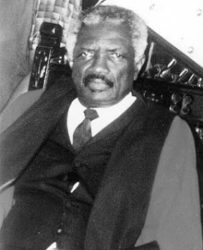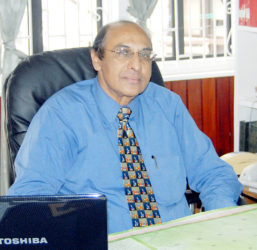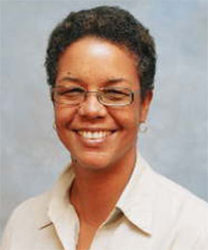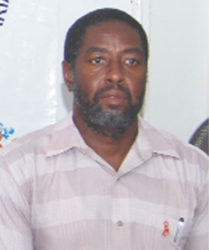One of the most important elections for sports associations in recent times takes place Wednesday at Olympic House, 76 High Street when members of the Guyana Olympic Association (GOA), an affiliate of the International Olympic Committee (IOC) sit to deliberate before deciding on the office bearers for the next four years.
The upcoming elections, which forms part of the Annual General Meeting (AGM) of the body, attracted a great deal of attention simply because of the recent sustained criticism of GOA president Kalam Azad Juman-Yassin, who will be seeking another four-year term in office.
Juman-Yassin has been the GOA president for 20 years. He took over from the now deceased Justice Rudolph Harper, who served as GOA president from 1984 to 1996.
Yassin has been criticized for the fact that under his stewardship this country has made little impact on the international scene.
The GOA is a non-governmental, non-profit organization with an overarching responsibility for the development of Olympic sports.


However, while the sports associations/federations that come under the umbrella of the GOA must conform to the statutes, principles and practices of the Olympic Charter, those associations/federations are autonomous organisations that are free from interference from sports bodies such as the GOA.
In fact, those organisations are also free from government interference as the recent attempt by the Guyana government to implement reforms to the Guyana Cricket Board via the passage of the Cricket Administration Act in parliament will show.
Another example is the tremendous influence exerted by the international federations such as FIFA which frown on government interference leading to local associations/federations in some cases ignoring rulings by the judicial system.
It is important to note, that for example, the GOA cannot interfere in team selections and such like and as such poor performances of the athletes at major games might not altogether be because of the lack of direction, vision or funding, from the GOA.
In fact the GOA can only deal with delinquent associations/federations if they violate in any way the principles of the Olympic Charter.
What this means is that the associations/federations are the ones that are ultimately responsible for the success, or lack of, at games such as the Pan American, Commonwealth and Olympics.
One criticism of the GOA ahead of the upcoming elections is the fact that nominations for the positions will come from the floor.
This situation seems archaic for such an auspicious organization as it robs the GOA of not quite vetting but of ensuring that persons that will challenge for the positions are eminently or suitably qualified.

Also it prevents those persons from lobbying and campaigning for the positions and robs the media of having opportunities to interview those persons so that readers and viewers can form opinions of the suitability or lack thereof, of the candidates.
Another fact that did not digest well was the fact that the GOA executive seem unaware as to who will be the returning officer.
While on the surface this might appear to reinforce the fact that the process is transparent, it begs the question as to who will ultimately select the returning officer and when this will be done.
The GOA, like most of its affiliates, see the media as a necessary evil, there to highlight its successes but not its failures.
The media is a watchdog organization and while Yassin might feel that he was being unfairly targeted as there seemed to be no criticism of the rest of the GOA executive, (three vice presidents, a general secretary, a treasurer, an assistant secretary/treasurer) he should have taken the opportunity to respond to his critics stating quite clearly what the GOA has achieved under his stewardship such as the many Olympic Solidarity Courses or the soon to be completed US1m headquarters which is situated at Liliendaal and such like so as to validate his reasons for wanting another term.
As GOA vice president Dr. Karen Pilgrim and General Secretary Hector Edwards pointed out, it is now left to the associations to decide whether to continue with the current executive or to go for change.

As a recent editorial in this newspaper pointed out, sport in Guyana continues to receive lip service and this is the real reason for the lack of success on the international scene.
Ideally what is needed is a tripartite approach to the development of sports and a committee made up of the representatives of the government, the GOA and the national associations/ federations should be set up in this regard.
Additionally, all national sports associations/federations should receive an annual subvention from the government and financial assistance from the GOA if possible. Of course there will be conditions attached, one of which is that the government and the GOA, must be allowed some input pertaining to their roles in the development of the respective disciplines.
What is also needed is for the government to once and for all state what the position with the National Sports Policy is.
This state of affairs is simply unacceptable. The previous administration was in office for over two decades and despite the many promises, the National Sports Policy, to the best of our knowledge, was never enacted.
One must recognize that most if not all of our athletes are amateurs competing against professionals and in order to improve their chances of success the athletes must be taught the basic fundamentals at a very early age so as to get the bio mechanics right.
In the past events such as the Barry Massy Games, the Guystac/Guymine Games and the Guyana Games helped assist local athletes in preparing for international competitions.
Instead of looking to win Olympic medals now, sports administrators must look at our young athletes and try and provide the right infrastructure for them to succeed.
This will entail them having access to top class coaches, undergoing rigorous training at home before participating in regional competitions, having dieticians prepare proper diets for the athletes, having qualified persons to deal with sports injuries and having access to sports psychologists.
And while all of the above might not guarantee medals at all the major games, it will surely lead to better performances by our athletes at international competitions and who knows, with a little bit of luck, that long awaited Olympic gold medal, just might materialize.









